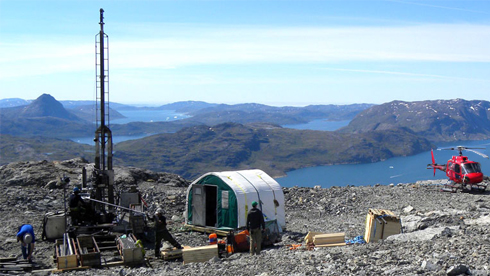The latest joke among Greenland's inhabitants is that the name of their capital, Nuuk, sounds extremely similar to the English word "nuke", meaning nuclear warhead. After all it would appear that Greenland, and therefore Denmark as well, will soon become one of the most important players in the world of uranium.
This is an idea that is giving a lot of people in the north the creeps. People have known for years that Greenland has rich uranium deposits. Not only did it seem almost impossible to access them, they were also regarded as the forbidden fruit.
Denmark has pursued a zero tolerance nuclear policy for a quarter of a century. Now Copenhagen is making a political U-turn. The Danish head of Greenpeace, Flarup Christensen, referred to the development as "the ultimate hypocrisy", reminding them: "We forced Sweden to close a nuclear power plant because it was too close to Danish soil."
Temptation of independence
What has happened? "A crucial element is that, in 2009, Greenland acquired greater autonomy to manage its natural resources itself", explains Cindy Vestergaard of the Danish Institute for International Studies during a telephone call from Copenhagen. Greater autonomy also means an end to the millions that flow annually from Copenhagen to Nuuk. It is difficult to live from prawns alone. That is why uranium has become so interesting.
Nevertheless, Greenland cannot decide on the issue unilaterally. Denmark continues to be responsible for foreign and defence policy. What is more, the island, which has fewer than 60,000 inhabitants, is unable to organise the mining and export on its own.
According to Vestergaard, "Everything will change if the plans are given the green light. That would make Denmark a nuclear player." At the moment Canada, Australia and Kazakhstan are the largest export countries. Given the enormous stocks, Denmark and Greenland would also become key players.
However, organising everything in the proper way would be a major achievement. "The trade in uranium is one of the most shady in the world. How can you be sure it does not end up in a nuclear weapon? The Australians claim it is possible, but evidently there is no guarantee." The plans could therefore burden the green, peace-loving Danes with a serious image problem.
Fisherman becomes miner?
Greenland has even more to lose. Global warming is improving the accessibility not just of uranium, but of other natural resources as well. It is even the case that, should uranium mining continue to be banned, Greenland would miss out on the economic benefits of large stocks of iron ore, copper, gold and rare earth metals in the vicinity. This while international mining giants, and countries such as South Korea and China, are just getting interested. On top of all this, Greenland could break the monopoly of China in the field of rare earth metals, which are very important for use in smart phones and cars.
As reported in The Copenhagen Post, the wealth of raw materials is both a curse and a blessing. The melting ice caps is also causing the disappearance of the shrimping villages. The crustaceans are seeking colder waters further north, leaving unemployment, an exodus of inhabitants and even suicide in their wake. The question is whether you can turn a fisherman into a miner.
Strategic importance
Indeed, that is not the only challenge. Last year, pressure from international companies led Greenland to approve a law which makes it possible to pay foreign workers less than Greenlanders themselves. For example, the American aluminium giant, Alcoa, wants to establish a factory in a village which has 3,000 residents. The plan was to bring in an equal number of Polish and Chinese workers. How would this affect a local community and how would the fewer than 60,000 island residents cope with having an industrial heavyweight in their midst?
The US has long been aware of Greenland's strategic importance. After World War II the Americans offered Denmark $100m for the island. Nuuk would now appear more and more to be going its own way. "Up to now, fishing was the only thing they had," Vestergaard explains. "However, it is clear that the mining of the raw materials – and they really have the lot – is now regarded as a way of eventually making the country independent." Elections are to be held in Greenland soon. There are no prizes for guessing what the most important theme is going to be.
View from Denmark
Greenland is too poor to refuse
Whatever the Greenlanders chose to do, their future will be shaped by “Murphy's Law”, which states that: “Everything that can go wrong, will go wrong” writes Politiken.
According to the Danish newspaper, exploiting the country's petroleum and mineral resources will inevitably lead to more nepotism in a country already plagued by corruption, and where there are few experienced people who can navigate between politics and business. For the newspaper –
Pollution and environmental destruction will once again trail in the slipstream of the “the frivolous atmosphere of the Klondike” and the social polarisation between the cities near the mines and the isolated villages is going to increase.
At the same time, the Greenlanders have no choice, writes Politiken.
Revenues from fishing are falling, and so are grants from Denmark, which is forcing the Greenlanders to experiment. Few who do not know Greenland can grasp the extent of the poverty there.
Was this article useful? If so we are delighted!
It is freely available because we believe that the right to free and independent information is essential for democracy. But this right is not guaranteed forever, and independence comes at a cost. We need your support in order to continue publishing independent, multilingual news for all Europeans.
Discover our subscription offers and their exclusive benefits and become a member of our community now!












